Quick Navigation to Unmountable Boot Volume Fixes:
| Workable Solutions | Step-by-step Troubleshooting |
|---|---|
| Fix 1. Repair Drive Errors | Open EaseUS Partition Master on your computer. Then locate the disk, right-click the partition...Full steps |
| Fix 2. Rebuild MBR | Right-click the boot disk and select "Rebuild MBR" option. Select the type of MBR...Full steps |
| Fix 3. Use Boot Repair Utility | Boot the computer again and enter the WinPE interface. Then, open EaseUS Partition Master...Full steps |
| Fix 4. Run Automatic Repair | In the menu, choose "Troubleshoot > Advanced Options > Startup Repair"...Full steps |
| Fix 5. Use SFC | In the menu, click "Troubleshoot > Advanced Options > Command Prompt"...Full steps |
| Fix 6. Run CHKDSK | Open Command Prompt using the steps with Fix 2, type chkdsk /r c: and...Full steps |
| Fix 7. Fix MBR | Try every USB port available; Determine you're using USB 2.0 or 3.0...Full steps |
Before you are going to try the solutions in this post, follow the GUARANTEED SOLUTIONS in this video (from EaseUS):
- 1 - Fix system file error and boot error using Windows installation disc.
- 2 - Fix BCD error. BCD error always cases system boot issue, Bcdedit command is able to fix the most of BCD error to make computer bootable.
- 3 - Uninstall software or driver in safe mode to fix BSOD. If you still want to learn some more fixes in this post, read on.
Overview of Unmountable Boot Volume Issue
Sometimes, users can be prevented from accessing the Windows operating system and boot their PC because of the Blue Screen of Death error. Caught by this problem, they will usually be told "Your PC ran into a problem and needs to restart" and some other detailed information which is helpful to find what caused the error and how to get it fixed. UNMOUNTABLE_BOOT_VOLUME is a popular error detailed information that usually appears on HP, Lenovo, Dell and Toshiba laptop in Windows 10/8/7/XP.
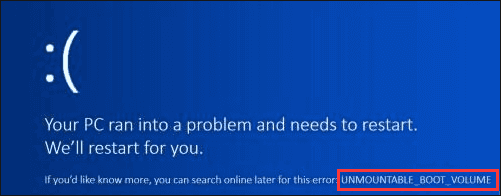
According to professional technicians, we know that unmountable boot volume error is caused by the following reasons:
- Corrupted system files
- Disk errors
- Damaged boot volume
- Damaged RAM and more...
Many reasons could lead to this error in addition to the reasons above. Next, you can learn fixes for each reason, no matter you have a Windows installation CD/disk or not. If you have important files saved on the PC and are extremely urgent to get them back, you can directly skip to Part3 to learn how to recover data from the PC that cannot boot.
Part 1. Fix Unmountable Boot Volume Without CD
If you don't have a Windows installation CD/disk, download EaseUS partition software first and use it to create a USB bootable disk, and then try the following two fixes to deal with unmountable boot volume error. Before starting, change the boot sequence of the unbootable PC in BIOS, and then restart the computer from the WinPE bootable disk. It will guide you to the main window of EaseUS partition software.
Fix 1. Check and Repair Boot Drive Errors
Right-click the boot drive and click the "Check partition" option, then choose the way that you want to use to check the hard drive and click "OK". The software will automatically scan hard disk partition and repair errors for you. Finally, click "OK" to finish the process.
Fix 2. Fix MBR (Master Boot Record)
Step 1. Create a WinPE bootable disk
- Launch EaseUS Partition Master, and click "Bootable Media" on the toolbar. Select "Create bootable media".
- Click "Next" to finish the process.
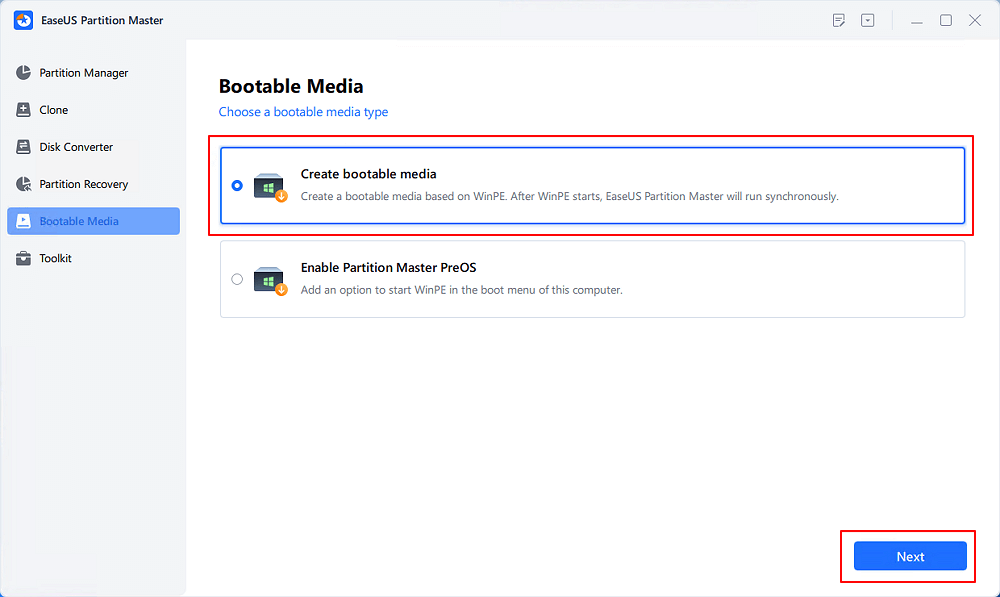
Step 2. Boot EaseUS Partition Master Bootable USB
- Connect the bootable USB or CD/DVD to your PC.
- Press F2 or Del when you restart the computer to enter the BIOS screen. Set and boot your computer from "Removable Devices" or "CD-ROM Drive". And then EaseUS Partition Master will run automatically.
Step 3. Rebuild MBR
- Click "Toolkit" and choose "Rebuild MBR".
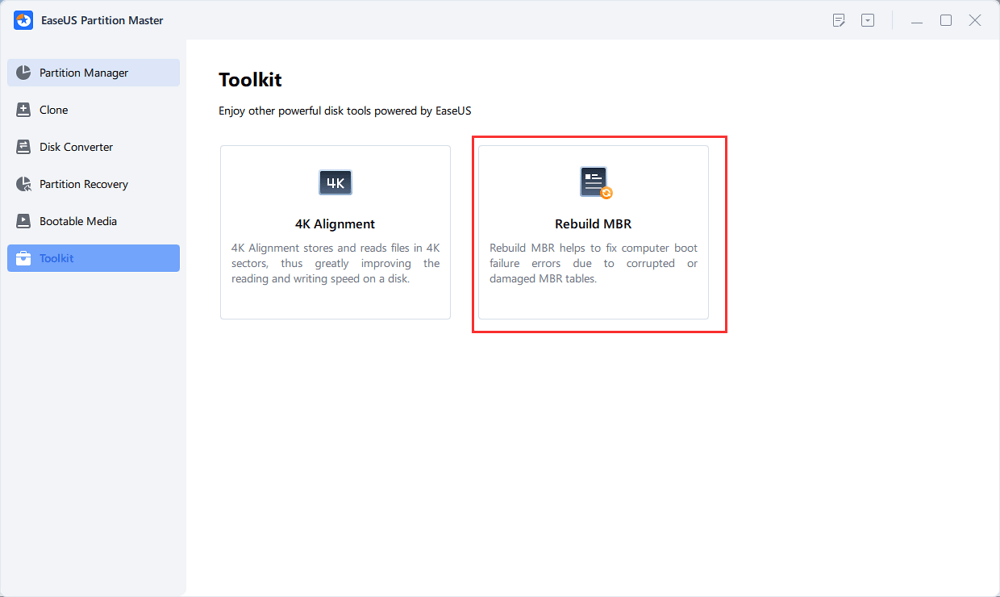
- Select the disk and the type of MBR. Then, click "Rebuild".
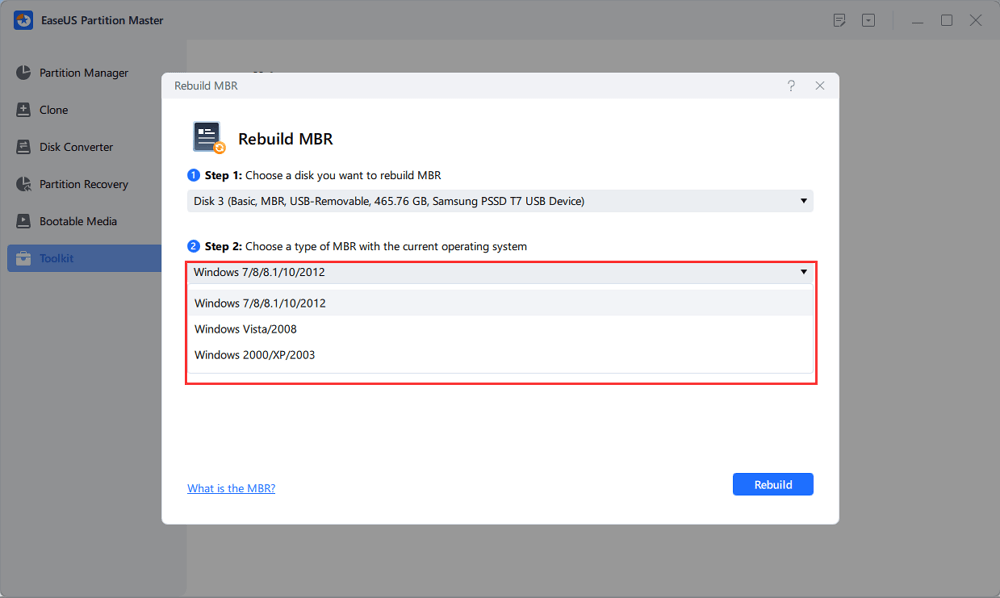
- After that, you can see "MBR has been successfully rebuilt on Disk X".
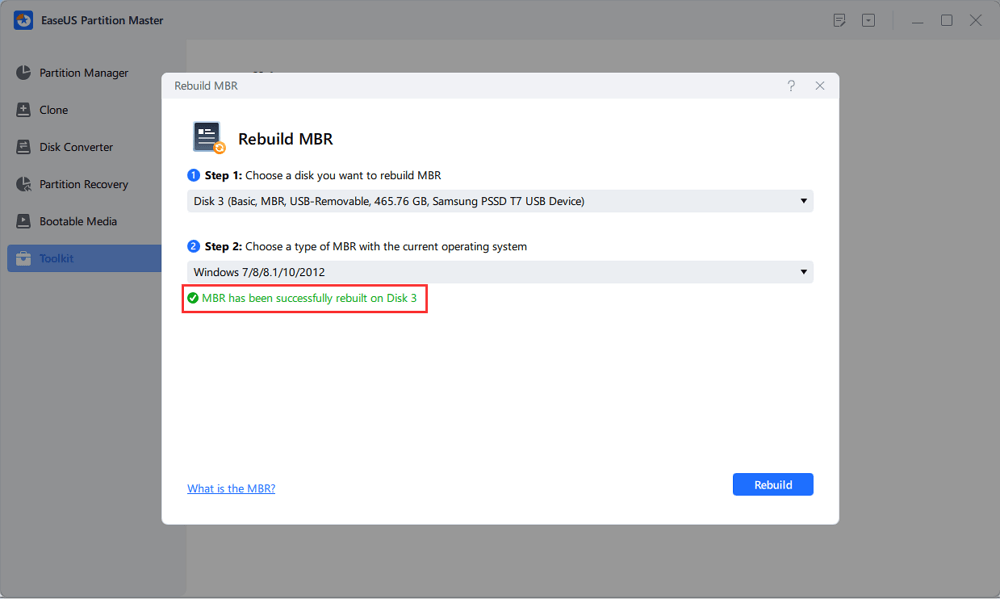
Fix 3. Use Boot Repair Utility
EaseUS Partition Master is one of the best Windows boot repair tools, and it also offers specialized users to fix boot problems. After extensive research and development, it helps you to fix unmountable volume errors automatically.
If your computer is unbootable now, start with Step 1 here. If it's bootable, move to Step 3 and start the process.
Step 1. Prepare a new PC and create a bootable media with EaseUS Partition Master
- On a new computer, connect an empty USB to your PC.
- Install and launch EaseUS Partition Master, go to the Bootable Media section, select "Create bootable media" and click "Next".
- Select the empty USB or external disk as target disk to create the bootable media for creating a Blue Screen error check tool.
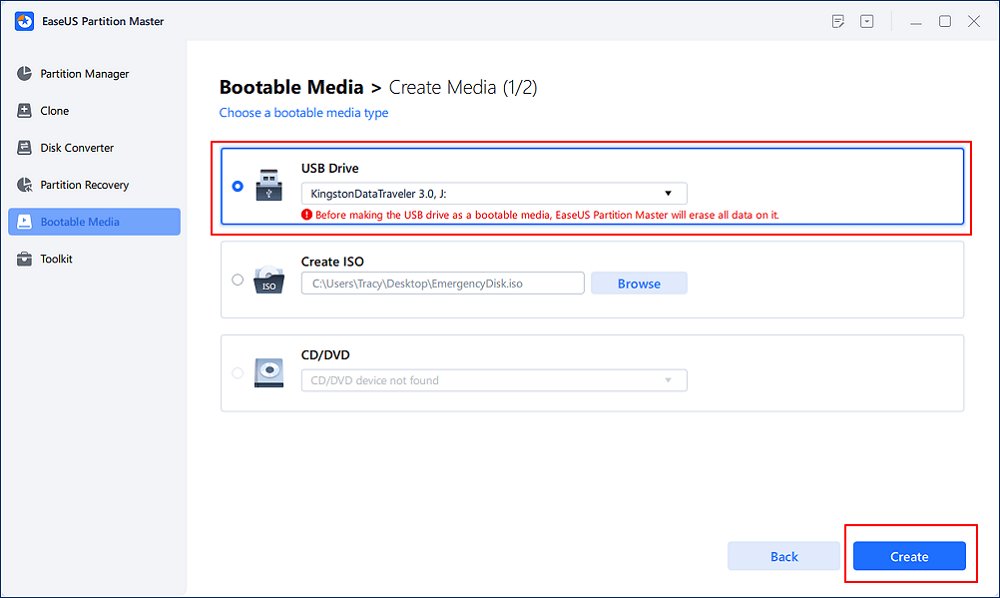
Step 2. Boot PC from EaseUS bootable USB
Then, connect the bootable USB to your PC with Blue screen error, and reboot PC from the USB by configuring it as a boot drive. The process is: restart PC, press F2/F8/F11/Del key to enter BIOS, go to boot menu and configure the USB as boot drive, save changes and restart the PC.
Step 3. Enable EaseUS Partition Master with its Boot Repair feature, and open "Blue Screen" tool.
When EaseUS Partition Master launches, go to the Toolkit section and click "Boot Repair".
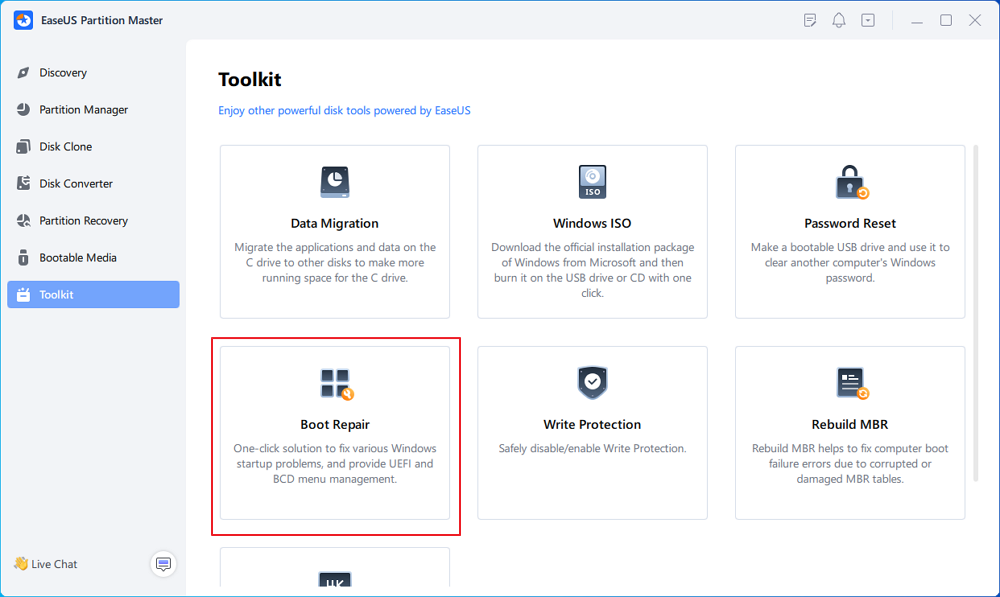
Then, click "Blue Screen" and click the listed Blue Screen error to check it's details. Or, you can type in a specific blue screen code or description to find the respective answer for fixing it.
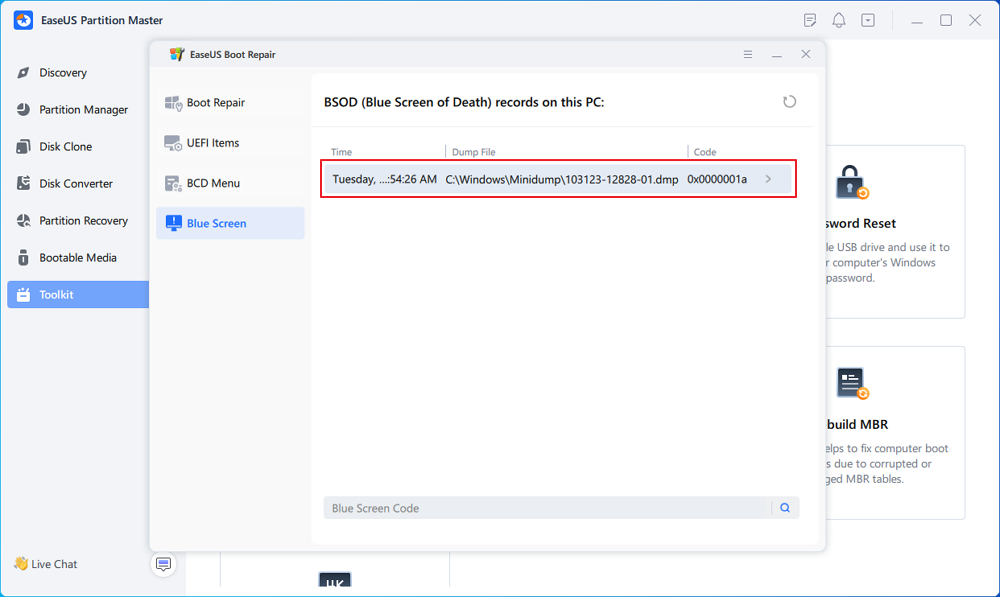
Step 4. Fix blue screen error
- Now, you can follow the solution guide to get rid of the respective BSOD or blue screen issue from your PC.
- If it doesn't work, you can also click the "Live Chat" button to request a remote assistance for fixing this issue with the help of EaseUS tech support team.
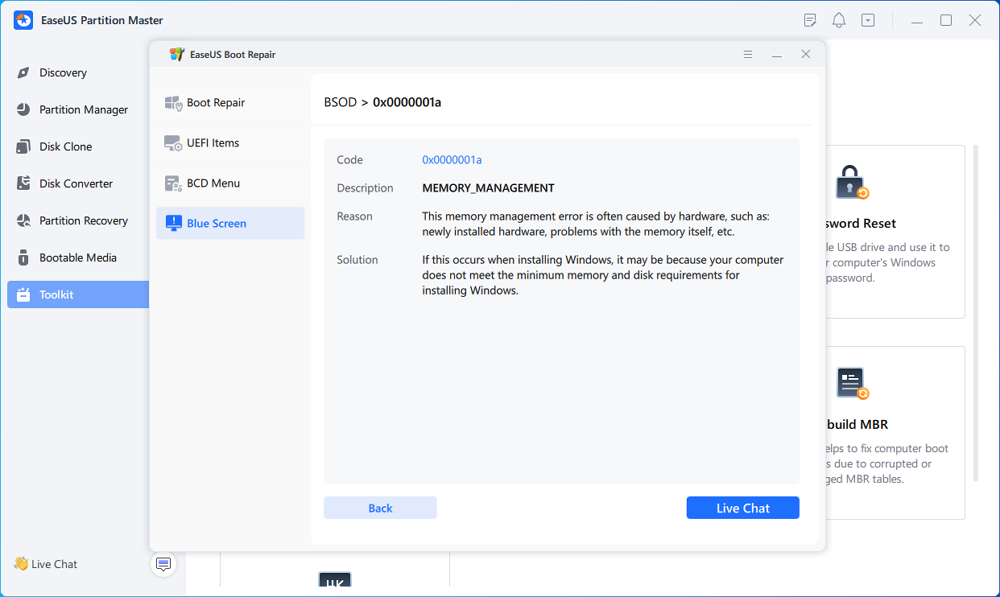
Part 2. Fix Unmountable Boot Volume Using Windows Installation CD/Disk
If you don't want to use third-party software, you can create a Windows installation CD/disk to solve the unmountable boot volume problem. Before starting, please first boot your PC from the bootable CD or USB device and then select the "Repair Your Computer" option in the Windows Setup window to get into the "Choose an option" menu.
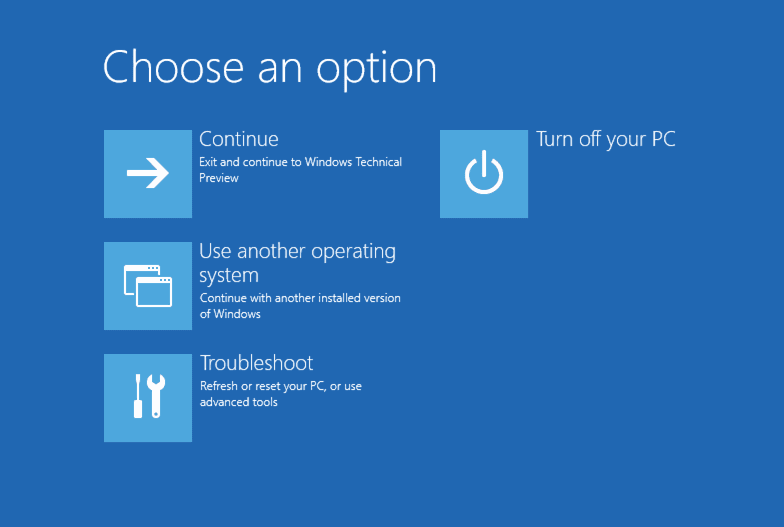
Fix 1. Run Automatic Repair
Step 1. In the menu, choose "Troubleshoot > Advanced Options > Startup Repair".
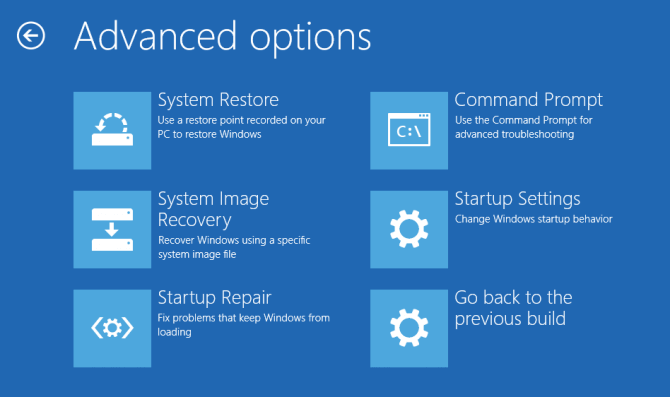
Step 2. Next, select the target operating system to fix. Windows will initiate the repair and then restart.
Fix 2. Use SFC /SCANNOW to Repair System Files
Step 1. In the menu, click "Troubleshoot > Advanced Options > Command Prompt".

Step 2. In the command line, type sfc /scannow and press Enter button.

Step 3. Restart your computer when the process is finished.
If you meet the unmountable boot volume error on Windows 11, click the link below to view more detailed information:
Fixed: Unmountable Boot Volume Windows 11
This guide discusses the issue of "Unmountable Boot Volume" in Windows 11. Explore its causes, troubleshooting steps, and fixes to regain access to your system.
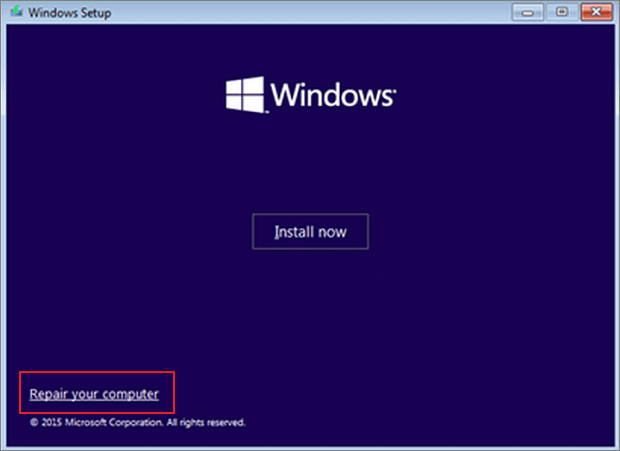
Fix 3. Run CHKDSK to Repair Boot Drive
Step 1. Open Command Prompt using the steps with Fix 2, type chkdsk /r c: and press "Enter".
Step 2. Type Y and hit "Enter" when you are prompted to schedule the check after a reboot.
Step 3. Reboot and let the check proceed. It might take a while.
Fix 4. Fix MBR
Open Command Prompt, type the following commands and press Enter after each move.
lbootrec /fixmbr
bootrec /fixboot
bootrec /rebuildbcd
exit
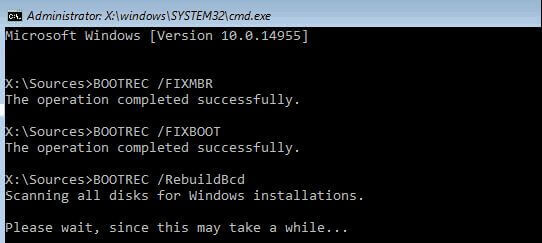
⭐Further Help
For any follow-up questions, our support team will offer comprehensive assistance:
EaseUS experts are available to provide you with 1-on-1 manual services (24*7) and help fix Windows boot error, BSOD or computer boot loop issues. Our experts will offer you FREE evaluation services and efficiently diagnose and resolve system boot failure, Windows stop codes and OS lagging issues using their decades of experiences.
- 1. Fix BSOD - blue/black screen of death error due to Windows update or other reasons.
- 2. Get rid of Windows boot error such as no bootable device found, or BCD file corruption.
- 3. Serve to fix 0X000_error codes on Windows system or OS boot loop issues.
Part 3. Recover Data When Unmountable Boot Volume Error Attacks
As I have mentioned above, if you have important files saved on the PC and are extremely urgent to retrieve them, you can directly learn how to recover data from the PC that cannot boot. All you need is EaseUS Data Recovery Wizard Pro with Bootable Media. It is mainly designed for data recovery cases of any system crash or booting problems. Try it to rescue your files when the hard disk is dead, damaged or failed.
Conclusion
You have learned 7 effective ways to solve the unmountable boot volume issue. You can try any one of them to fix unmountable boot volume Windows 10. Also, the video on the top can solve the common blue screen errors effectively, you can follow the details in the video. If you have any better solution to solve unmountable boot volume, you can share it and tell us.
Unmountable Bootable Volume (People Also Ask)
There are some FAQs about unmountable bootable volume:
1. What is the boot volume?
The boot volume refers to the disk volume that contains the Windows operating system files and the supporting files.
2. What causes unmountable boot volume?
- Corrupted system files
- Disk errors
- Damaged boot volume
- Damaged RAM and more...
3. How do I fix unmountable boot volume?
- 1. Check and Repair Boot Drive Errors
- 2. Fix MBR (Master Boot Record)
- 3. Run Automatic Repair
- 4. Use SFC /SCANNOW to Repair System Files
- 5. Run CHKDSK to Repair Boot Drive
- 6. Fix MBR
4. How do I boot from a USB drive in Windows 10?
- 1. Create an emergency disk with EaseUS partition software.
- 2. Connect the bootable USB drive to a USB port on your PC. Turn on or restart your PC.
- 3. Press F2, Del or F8 to change your computer boot sequence in BIOS. Set to boot the PC from Removable Devices or CD-ROM Drive beyond Hard Drive. Press F10 to save and exit.
Was This Page Helpful?
Roxanne is one of the main contributors to EaseUS and has created over 200 posts that help users solve multiple issues and failures on digital devices like PCs, Mobile phones, tablets, and Macs. She loves to share ideas with people of the same interests.
Written by Tracy King
Tracy became a member of the EaseUS content team in 2013. Being a technical writer for over 10 years, she is enthusiastic about sharing tips to assist readers in resolving complex issues in disk management, file transfer, PC & Mac performance optimization, etc., like an expert.
Related Articles
-
How to Lock Mac Screen [7 Fast Ways to Lock Mac]
![author icon]() Brithny/2024-10-25
Brithny/2024-10-25 -
SD Card File System for Android | What Is the Best Format for Android [Detailed Guide]
![author icon]() Sherly/2024-07-01
Sherly/2024-07-01 -
SSD Showing RAW File System? All Fixes Here 2024
![author icon]() Sherly/2024-11-27
Sherly/2024-11-27 -
PC Stuck on BIOS Screen - How to Fix?🔥
![author icon]() Jerry/2024-11-25
Jerry/2024-11-25
EaseUS Data Recovery Services
EaseUS data recovery experts have uneaqualed expertise to repair disks/systems and salvage data from all devices like RAID, HDD, SSD, USB, etc.

